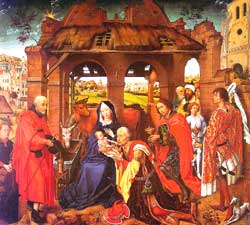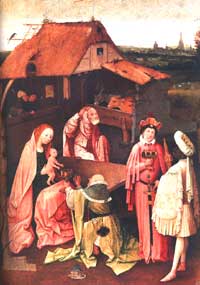Readings:
Eucharistic:
Isaiah 60:1-9;
Psalm 72:1-7,10-14;
Ephesians 3:1-12;
Matthew 2:1-12Daily Office:
AM Psalm 46, 97;
PM Psalm 96, 100
Isaiah 49:1-7;
Revelation 21:22-27;
Matthew 12:14-21Preface of the Epiphany
PRAYER (traditional language)
O God, who by the leading of a star didst manifest thy only-begotten
Son to the peoples of the earth: Lead us, who know thee now by faith,
to thy presence, where we may behold thy glory face to face; through the
same Jesus Christ our Lord, who liveth and reigneth with thee and the
Holy Spirit, one God, now and for ever. Amen.
PRAYER (contemporary language)
O God, by the leading of a star you manifested your only Son to the
peoples of the earth: Lead us, who know you now by faith, to your presence,
where we may see your glory face to face; through Jesus Christ our Lord,
who lives and reigns with you and the Holy Spirit, one God, now and for
ever. Amen.
Readings and collect slightly revised in Lesser Feasts & Fasts 2022.
Return to Lectionary Home Page
Webmaster: Charles Wohlers
Last updated: 4 Nov. 2023
THE FEAST OF THE HOLY EPIPHANY
(6 January)
NOTE ON THE READINGS:
The readings from Isaiah and the Psalms, as given above, speak of kings
bringing tribute. It is perhaps worth noting, that Matthew does not say
that they were kings, or even that they were Gentiles, and, contrary to
his usual practice in his Infancy Narrative, does not refer to these passages
from the Jewish Scriptures.
NOTE ON THE FEAST:
"Epiphany" is a word of Greek origin, related to such English
words as "theophany," "phenotype," and "phenomenon."
It means an appearance, a displaying, a showing forth, a making clear
or public or obvious. On this day, Christians have traditionally celebrated
the making known of Jesus Christ to the world.
 Several
events have been thought of as special instances of the making known of
Our Lord, such as: His birth; the coming of the Magi; His Baptism; His
first miracle at Cana. Current majority usage, at least in the West, celebrates
His birth on 25 December, the coming of the Magi on 6 January, and His
Baptism on the next Sunday. On the following Sundays up to the beginning
of Lent, we remember Our Lord's public preaching of the kingdom, particularly
the earlier stages of that preaching when opposition had not yet crystallized.
On the Last Sunday after Epiphany (the Sunday before Lent), we commemorate
the Transfiguration, the climax of this first phase of our Lord's public
ministry.
Several
events have been thought of as special instances of the making known of
Our Lord, such as: His birth; the coming of the Magi; His Baptism; His
first miracle at Cana. Current majority usage, at least in the West, celebrates
His birth on 25 December, the coming of the Magi on 6 January, and His
Baptism on the next Sunday. On the following Sundays up to the beginning
of Lent, we remember Our Lord's public preaching of the kingdom, particularly
the earlier stages of that preaching when opposition had not yet crystallized.
On the Last Sunday after Epiphany (the Sunday before Lent), we commemorate
the Transfiguration, the climax of this first phase of our Lord's public
ministry.
Today, then, we commemorate the visit of the Magi, a token of the day when all the peoples of the earth will acknowledge Jesus Christ as Lord, God, and Savior. The visit of the Magi is recorded in the second chapter of Matthew. Magi (magoi), the Latin (Greek) plural of magus (magos), referred originally to the priests of Parsiism, the monotheistic religion preached in Persia by Zoroaster in about the sixth century BC. In later years it came to mean magicians, priests, physicians, scribes, scholars, or learned men. From it we derive our word "magic." The KJV Bible translates the word as "wise men." Matthew tells us how they came to Jerusalem and then to Bethlehem, and gave gifts to the infant Jesus. (For a discussion of whether this is a historical event, look for the document of that name on the Web page http://elvis.rowan.edu/~kilroy/CHRISTIA/library/infancy1.html. See also parts 2,3, and 4. Ignore the references to the Assumption of Moses. These are based on what turned out to be a bad translation.) In poem and picture, the wise men came to be thought of as three kings, and in many countries (particularly Spanish-speaking ones), children receive gifts, not on 25 December, but on 6 January in memory of the gifts that the wise men brought to the Holy Child. Christian writers have interpreted the gold as a sign that Jesus is King, the Frankincense as a sign that He is God, and the myrrh (used in embalming) as a sign that He is by His death and Resurrection the Savior of the world. This imagery is found in the song, "We Three Kings of Orient Are." The three gifts are also understood a a sign of three responses that we ought to make to Christ. See the following hymn:
THE BLESSED BIRTH
 That
so thy Blessed Birth, O Christ,
That
so thy Blessed Birth, O Christ,
might through the world be spread about,
the star appeared in the East,
whereby the Gentiles found thee out;
and offered thee Myrrh, Incense, Gold,
thy three-fold office to unfold.
Tears that from true repentance drop,
instead of Myrrh present will we:
for Incense we will offer up
our prayers and praises unto thee;
and bring for Gold each pious deed,
which doth from saving faith proceed.
And as those wise men never went
to visit Herod any more,
so, finding thee, we will repent
our courses followed heretofore;
and that we homeward may retire
the way by thee we will enquire.
George Wither (1588-1667) in his HYMNES AND SONGS OF THE CHURCH, 1623
There is a musical setting by H. Walford Davies (1869-1941)
HYMN FOR THE EPIPHANY SEASON
Songs of thankfulness and praise, Jesus, Lord, to thee we raise,
manifested by the star to the sages from afar;
Branch of royal David's stem in thy birth at Bethlehem;
anthems be to thee addrest, God in man made manifest.
Manifest at Jordan's stream, Prophet, Priest, and King supreme;
and at Cana, wedding guest, in thy Godhead manifest;
manifest in power divine, changing water into wine;
anthems be to thee addrest, God in man made manifest.
Manifest in making whole palsied limbs and fainting soul;
manifest in valiant fight, quelling all the devil's might;
manifest in gracious will, ever bringing good from ill;
anthems be to thee addrest, God in man made manifest.
Manifest on mountain height, shining in resplendent light,
where disciples filled with awe thy transfigured glory saw.
When from thence thou leddest them steadfast to Jerusalem,
cross and Easter day attest God in man made manifest.
Grant us grace to see thee, Lord, mirrored in thy holy word;
may we imitate thee now, and be pure, as pure art thou;
that we like to thee may be at thy great epiphany;
and may praise thee, ever blest, God in man made manifest.
Christopher Wordsworth (1807-1885) Stanza Four by F. Bland Tucker (1895-1984)
by James Kiefer